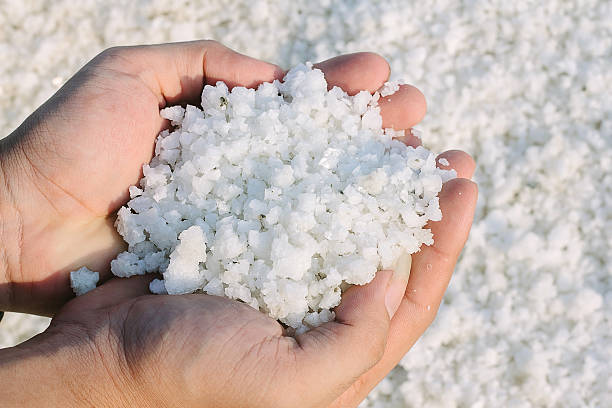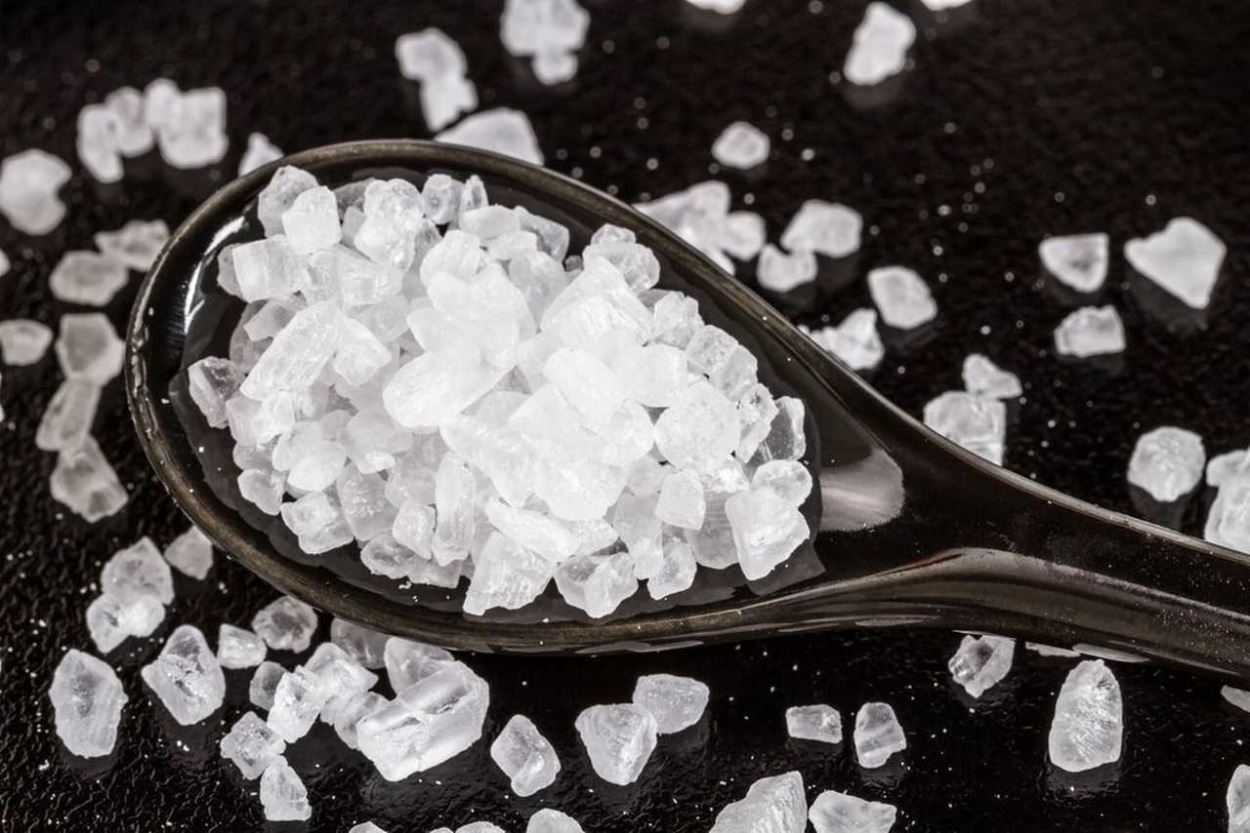[ad_1]
Hard water isn’t harmful but can lead to problems, including dry skin, clogging up your plumbing, and impacts on your water taste. A water softener is the only way to remove the dissolved minerals that make up hard water.
After using a water softener over and over again, you’ll need to recharge the filter with more salt to continue working effectively. When you need to put your water softener through a regeneration cycle, you’ll need water softener salt or sodium chloride.
There are different types of salt that can be used in a water softener, but not all are equally effective. In general, you want to use a salt that is high in purity and free of impurities. The right type of salt can help your water softener perform better and prevent damage to your appliances and water softening system.
Here are the various types of water softener salt and what to consider with each one.
Evaporated Salt Pellets
Evaporated salt is one of the most popular types of salt used in water softeners. Evaporated salt is made by an evaporation process using water and steam, which produces salt in crystalization form. Salt crystals are then processed using a drying and screening process before they’re formed into pellets.
Evaporated salt forms when raw salt is converted to sodium chloride and all the moisture has been removed. What’s left from this process is 100 percent pure salt. Because of this pure salt, evaporated salt pellets are highly effective at treating hard water and making it soft.
In addition, evaporated salt can help your water softener’s performance in the long run and avoid water softener problems like salt bridges, which are salt crusts extending through the brine tank, and insoluble buildup. If you’re looking for an ideal salt for your best water softener shower head, then evaporated salt is the real deal.
Solar Salt
Solar salt, commonly known as sea salt, is a byproduct of evaporated seawater. Solar salt is commonly found in pellet or crystal form. Because solar salt is made from brine, insoluble impurities in the salt can be eliminated. Solar salt’s sodium chloride content is usually 99.5% or higher.

It’s highly soluble, meaning it can dissolve much faster than other types of water softener salts. You can use it if your system suffers from frequent salt buildups, mushing, or bridging. Using this type of salt can help extend the life of your water softener and lower the need for frequent maintenance.
On the downside, its insoluble level is around 0.03%, which means it may cause problems like insoluble buildup and a salt bridge, which will need to be cleaned.
Rock Salt
Rock salt is the least expensive type of water softener salt. It’s extracted during rock salt mining and crushed into smaller pieces. Its sodium chloride content is around 95% or higher, depending on the mine from which it comes. Rock salt is also the rawest kind of salt on this list, which means that the salt crystals from the salt itself may contain other traces.

Rock salt is ideal for de-icing roads because it’s not always ideal for water softeners because impurities like salt and shale found in the rock salt may clog or damage your water softener. Rock salt also contains a high amount of calcium sulfate and is less pure than water softener salts like evaporated salt or solar salt. It’s also soluble like other types of water softener salts, which can cause buildup and require more frequent water softener maintenance.
Block Salt
Block salt is a type of salt that is less pure than solar salt or evaporated salt but more pure than rock salt. Block salt typically contains between 96 and 99 percent sodium chloride and is used in some water softeners. Because it’s less pure, block salt may contain other minerals like calcium sulfate that can cause buildup or clog your water softener.
Potassium Chloride
Potassium chloride is a great alternative to salt because it’s 99.9% sodium free. Potassium chloride comes in pellet form and can be used to regenerate the softening resin. This makes it perfect for those who are looking to reduce their sodium intake.

However, it’s not healthy for people with hypertension or a history of this condition in their family. Potassium chloride pellets are more expensive and are not as accessible as salt pellets. If you’re thinking of switching from salt to potassium chloride pellets, you might have to increase the salt dosage program setting during the regeneration process. It’s best to consult with a water softener expert if you want to use potassium chloride in your water softener.
Best Water Softener Salt Brand
Now that you know some of the best salt to use in your water softener, you might be wondering which brand is the best. Here are some of our top picks:
Morton
Morton is one of the biggest names in water softener salt manufacturing. They offer a variety of products, including evaporated salt and potassium chloride. Morton has stellar ratings on retail sites like Home Depot, and their products are reasonably priced and compatible with most water softeners on the market.
Diamond Crystal
Diamond Crystal is another major salt manufacturer with a good reputation. Their products are also reasonably priced, and they offer both evaporated and solar salt options. Diamond crystal has also patented a dual handle design for their bags that allows you to pour the salt easily.
Nature’s Own
Nature’s Own is a lesser known salt manufacturer, but they offer an interesting product: sea salt. This could be a good option if you’re looking for a more natural product. It’s also one of the more affordable options on this list.
Windsor Salt
Windsor is a good budget water softener salt brand to consider. Their system Saver II Product is very affordable for 99.7% pure water softener salt. They’ve been in the market for quite a long time, which means they’re an experienced company you can trust.
How to Maintain Your Brine Tank
- Regularly check the salt level in your brine tank at least once a month. Once the salt in the brine tank falls below one quarter full, you run the risk of not having softened water.
- For optimal efficiency, keep the salt in the brine tank at least three or four inches above the water level but no more than four inches below the top of the tank.
- Loosen any encrusted salt around the brine tank and ensure that the large blocks are broken up before adding any new salt to it. Adding hot water to the salt blocks will help to break them up.
FAQs on the Best Salt to Use in Water Softener
What is water softener salt used for?
Once you know anything about how a water softener works, you’ll simply know that they don’t function without a supply of good salt. A water softener salt helps to remove the magnesium and calcium from water, making it soft. These minerals are the reason why water is considered hard.
Does it matter what salt I use in the water softener?
Yes, the kind of salt you use in water softener matters a lot because different types of salt have different effects. For instance, solar salt is known to be more effective in softening water than rock salt.
What is in water softener salt?
The answer to this question mainly depends on the type of water softener salt you’re using. For instance, if you’re using solar salt, it’s made of evaporated sea salt. On the other hand, rock salt is mined from underground salt deposits.
How much salt should be in a water softener?
Knowing how much salt should be in a water softener is an important step to consider. This is because using too much salt can clog up your system while using too little salt can slow down the regeneration process. There are certain factors that can determine the amount of salt to use in your system, including your water hardness, the needs of your family, the size of your brine tank, and the efficiency of your water softener.
Final Thought on the Best Salt to Use in Water Softener
A water softener is an expensive element that proper care needs to be taken. To maintain it for a longer time and get the best performance, you need to use the best quality salt. Good maintenance involves refilling the brine tank with the right type and salt.
Water softeners work well with sodium chloride or potassium chloride, but depending on your situation, you might want to use a different type of salt. If you’re not sure what to use, consult your owner’s manual or ask a salesperson before purchasing.
The post What Salt to Use in Water Softener appeared first on Kitchen Infinity.
[ad_2]
kitcheninfinity.com










